This Monday afternoon the 98th edition of the Tour of Italy, the Giro d'Italia 2015, was officially presented in Milan, in presence of Brian Cookson, the president of the International Cycling Union. 3,487.8 kilometers longs, this Giro commemorates Alfredo Martini*. The organisor of the Giro is also the organisor of the Milan-Sanremo classic and thus insists on the fact that this Giro is somehow a 3 weeks Classicissima the other way around, since the start will be close to Sanremo** and the race finishes in Milan.
In this article you'll find a quick presentation of the 21 stages which make up this Tour of Italy and the first details about the race route of these stages.
The Giro d'Italia 2015 in a few numbers
The 98th Tour of Italy will take place from 9 till 31 May 2015 and is presented by its organisor RCS Sport as a Giro with a balanced race route, in line with recent years, with fewer transfers and an approach geared up for modern cycling.Let's have a look at this Giro d'Italia in a few numbers:
> 1 foreign country visited: Switzerland
> 2 rest days: Monday 18 May and Monday 25 May
> 5 mountain stages: Fiuggi > Campitello Matese, Marostica > Madonna di Campiglio, Pinzolo > Aprica, Gravellona Toce > Cervinia and Saint Vincent > Sestriere
> 7 flat stages: Albenga > Genova, Montecatini Terme > Castiglione della Pescaia, Grosseto > Fiuggi, Civitanova Marche > Forlì, Montecchio Maggiore > Jesolo, Tirano > Lugano (CH) and Turin > Milan
> 7 medium mountain stages: Rapallo > Sestri Levante, Chiavari > La Spezia, La Spezia > Abetone, Benevento > San Giorgio del Sannio, Forlì > Imola (Enzo & Dino Ferrari Autodrome), Imola > Vicenza (Monte Berico), Melide (CH) > Verbania
> 7 mountain top finishes: Abetone, Campitello Matese, Vicenza (Monte Berico), Madonna di Campiglio, Aprica, Cervinia, Sestriere
> 76.8 kilometers of time trials: 17.6 km in the opening team time trial and 59.2 km in the inidividual time trial between Treviso and Valdobbiadene
> 2,178 altitude meters for the rooftop of the Giro, the Cima Coppi: the Colle delle Finestre
> 43,000 vertical meters climbed
The Giro d'Italia 2015 race route in detail
Hereunder you'll find for each of the stages a short presentation and the map and profile of the stage. It's always interesting that RCS Sport provides these details right at the official presentation, but please bear in mind that the detailed race route and thus also the profile of the stages often changes quite a lot before the race starts in May. Before the start you'll thus find a new article on velowire.com which will present the official and final informations!CONTINUE READING AFTER THIS ADVERTISEMENT
1/ Saturday 9 May 2015 - San Lorenzo Al Mare > Sanremo - team time trial - 17.6 km
The first stage will be a team time trial and after the start from San Lorenzo Al Mare, the riders will first go through a tunnel before they get on the Riviera dei Fiori bike path, towards Sanremo, the finish city of the Milan-Sanremo classic.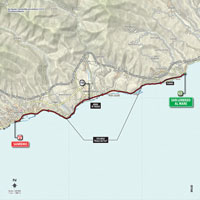
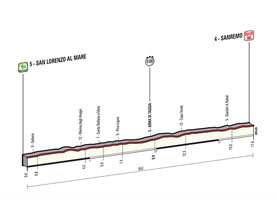
2/ Sunday 10 May 2015 - Albenga > Genova - 179 km
The 2nd stage will start in Albenga, first with a first loop including a first climb, which almost comes back to the start. From there, the riders will follow the coast and will go via Savona before they briefly go landinwards to go fin the Prato Zanino (Sciaborasca) climb. Once they arrive in Genova, the riders will do 2 laps on a 6.8 kilometer long circuit.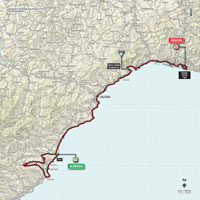
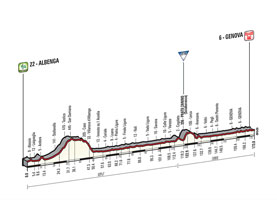
3/ Monday 11 May 2015 - Rapallo > Sestri Levante - 136 km
The 3rd stage of the Giro d'Italia 2015 is a short stage but this is also already the first medium mountain stage, starting in Rapallo. Indeed, from Recco, the riders go landinwards and climb the Colle Caprile.North of the Lago di Brugneto, the peloton starts the descent back to the coast, via the Barbagelata climb. Once they get in Chiavari, they follow the coast line until the finish in Sestri Levante.
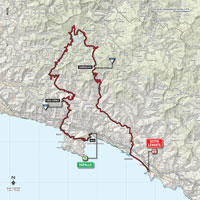
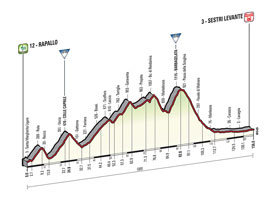
4/ Tuesday 12 May 2015 - Chiavari > La Spezia - 150 km
150 kilometers separate Chiavari from La Spezia in the second medium mountain stage during which the riders climb the Colla di Velva, the Passo del Termine and in the final circuit after the first crossing of the finish line (17.9 km long circuit) the Biassa climb.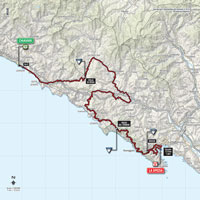
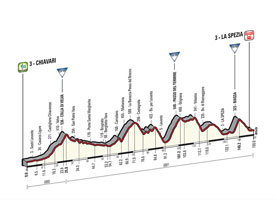
CONTINUE READING AFTER THIS ADVERTISEMENT
5/ Wednesday 13 May 2015 - La Spezia > Abetone - 152 km
This 5th stage is yet anothe medium mountain stage, the first one with a mountain top finish, in Abetone.After the start from La Spezia, the riders quickly go landinward and around half-stage they climb the Foce Carpinelli.
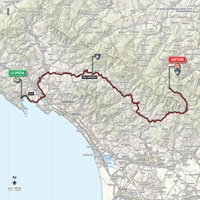
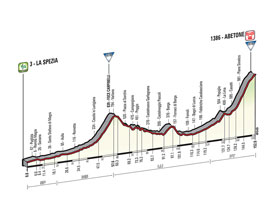
6/ Thursday 14 May 2015 - Montecatini Terme > Castiglione della Pescaia - 181 km
After 3 medium mountain stages, the 6th stage is a flat stage, starting in Montecatini Terme. Going from north to south, the riders do however get to do the Pomarance climb but this short hilly part half-way the stage was not enough to make it a medium mountain stage. The last part of the stage towards the finish in Castiglione della Pescaia is slightly downhill.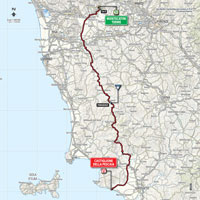
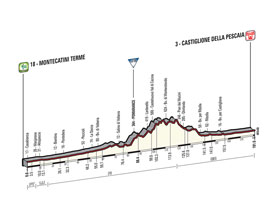
7/ Friday 15 May 2015 - Grosseto > Fiuggi - 263 km
The 7th stage is also a flat stage, and with its 263 kilometers it's the longuest stage of this Giro d'Italia 2015. From Grosseto, the race will first follow the coast line, before it goes landinwards towards Viterbo and then turn around Rome via the short Monterotondo climb, towards the finish in Fiuggi.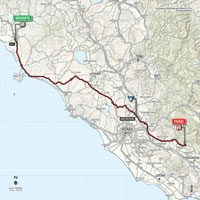
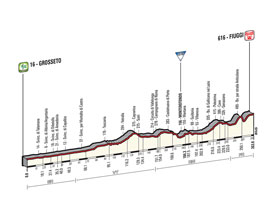
8/ Saturday 16 May 2015 - Fiuggi > Campitello Matese - 188 km
It starts to get serious with the comeback of medium mountain stages for this 8th stage on Saturday 16 May 2015, starting in the city where the stage finished the day before, Fiuggi. Indeed, in this stage the riders will see a much more hilly stage profile than in the previous stages, especially with the Forca d'Acero climb, with the shorter Valico del Macerone climb and with the final climb towards the mountain top finish in Campitello Matese (13 km at 6.9% going up to 12%).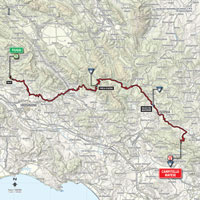
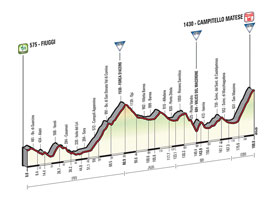
CONTINUE READING AFTER THIS ADVERTISEMENT
9/ Sunday 17 May 2015 - Benevento > San Giorgio del Sannio - 212 km
This 9th stage over 212 kilometers starting in Benevento is again a pretty hilly medium mountain stage. After the start from Benevento, the riders will first do a short loop north of the city before they descend south and start the different climbs once they've reached the most southern point of this stage, starting with the Monte Terminio (20 km at 4.2%) and Colle Molella (5.7 km at 7.5%) and, must closer to the finish in San Giorgio del Sannio, the Passo Serra.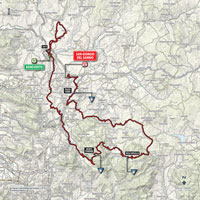
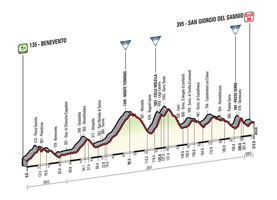
R1/ Monday 18 May 2015
This Monday 18 May, the riders will get the first rest day of this Giro d'Italia 2015.10/ Tuesday 19 May 2015 - Civitanova Marche > Forlì - 195 km
The 10th stage will be a flat stage which mainly follows the coast line between Civitanova Marche annd Forlì, via Ancona, Pesaro, Rimini and Cesena. Close to Pesaro the riders climb the Monte di Bartolo which will however probably not prevent the sprinters to battle for victory that day.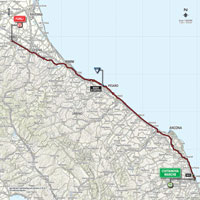
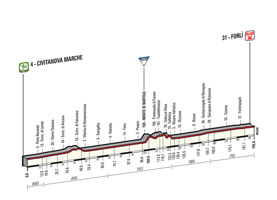
11/ Wednesday 20 May 2015 - Forlì > Imola (Autodromo Ferrari) - 147 km
This 11th stage will be a bit particular because after the start from Forlì the riders will do a short visit south-east of the start city, via the climb of the Passo del Trebbio and the Valico del Prugno, but they'll then get to Imola where they arrive on the Autodromo Ferrari circuit, on which they'll do 3 laps of 16.9 kilometers with the climb of Tre Monti (which will award points for the King of the Mountains classification only in the 2nd lap).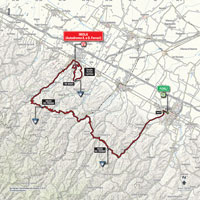
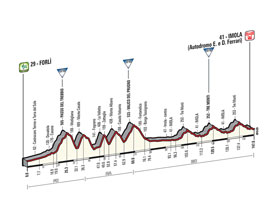
CONTINUE READING AFTER THIS ADVERTISEMENT
12/ Thursday 21 May 2015 - Imola > Vicenza (Monte Berico) - 190 km
The 12th stage will start in Imola itself, for 190 kilometers towards Vicenza. This will be a medium mountain stage but the 125 first kilometers are completely flat, up to the first bits of the Castelnuovo climb. This climb will be followed a bit further by the Crosara climb and the final climb towards the mountain top finish, on the Monte Berico.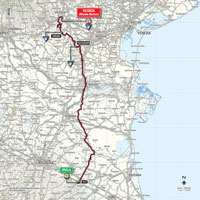
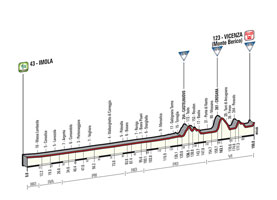
13/ Friday 22 May 2015 - Montecchio Maggiore > Jesolo - 153 km
The 13th stage follows a completely flat race route and from Montecchio Maggiore, the riders will go via Vicenza towards Mestre before they finish in Jesolo where they'll turn around on a landslide in the sea.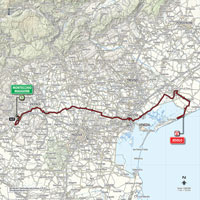
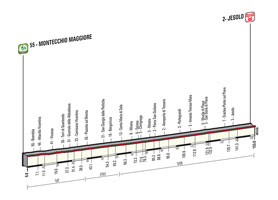
14/ Saturday 23 May 2015 - Treviso > Valdobbiadene - 59.2 km - individual time trial
At a bit over one week from the finish of the Giro d'Italia 2015, the riders will see a race against the clock, over a distance of no less than 59.2 kilometers. A time trial expert could thus well take back some of the time he lost in the mountains or even completely decide the race if that rider performed well in the mountains as well.The first half of this stage between Treviso and Valdobbiadene is completely flat, followed by a slightly more hilly part even though we can not call them mountains. One official climb is on the programme of this individual time trial, in San Pietro di Feletto.
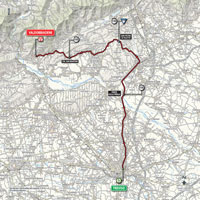
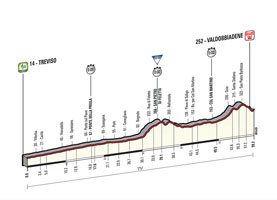
15/ Sunday 24 May 2015 - Marostica > Madonna di Campiglio - 165 km
The 15th stage is the first real mountain stage, starting in Marostica. Going north-west, the riders will start the climb of La Fricca, before they get to the city of Trento. They'll then continue their trip west to get to the Passo Daone climb (8.4 km at 9.2% with a maximum of 14%). After the descent, going north, they'll get on the final climb towards the summit of the Madonna di Campiglio (15.5 km at 5.9% with a maximum of 12%).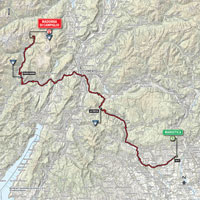
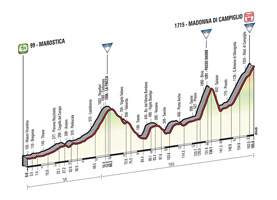
CONTINUE READING AFTER THIS ADVERTISEMENT
R2/ Monday 25 May 2015
Le deuxième jour de repos est prévu ce Monday 25 May 2015.16/ Tuesday 26 May 2015 - Pinzolo > Aprica - 175 km
The second mountain stage will start in Pinzolo. Right from the start, the riders will start the climb of the Campo Carlo Magno and after its descent they'll go on with the second climb of the day, the Passo del Tonale (15.2 km at 6% with a maximum of 10%). The Aprica will be a shorter climb which they'll find at the foot of this second climb and where they'll cross the finish line for the first time. After a short easier part, the riders will start the very difficult climb of the Passo del Mortirolo (12.8 km at 10.1% with a maximum of no less than 18%). The final climb will again be a bit less difficult, again on the Aprica (13.9 km at 3.4% with a maximum of 15%).
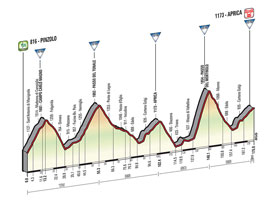
17/ Wednesday 27 May 2015 - Tirano > Lugano (CH) - 136 km
A short stage, of only 136 kilometers, on a relatively flat race route is on the programme this Wednesday 27 May. Indeed, after the climb of the Teglio which the riders will start climbing after only 8 kilometers in the race from the start in Tirano, the profile is relatively flat for this 17th stage. The finish in Switzerland, in Lugano, could thus well end up in a sprint for stage victory.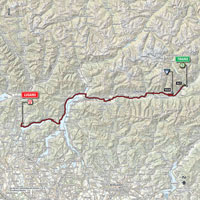
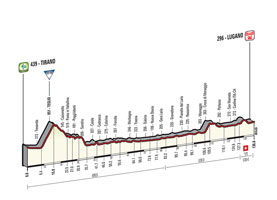
18/ Thursday 28 May 2015 - Melide (CH) > Verbania - 172 km
Still starting in Switzerland, from Melide, at the border with Italy, the riders will find a medium mountain stage of 172 kilometers.They'll turn around the Lago Maggiore towards the finish in Verbania where they'll get on a circuit which will bring them back there but not without having climbed the Monte Ologne which culminates at 1168 meters after a 10.4 kilometer long climb at 9% (maximum of 13%). From there, they'll descend back to Verbania where they'll this time battle for victory in this 18th stage.
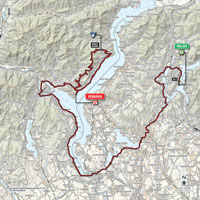
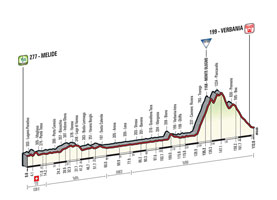
CONTINUE READING AFTER THIS ADVERTISEMENT
19/ Friday 29 May 2015 - Gravellona Toce > Cervinia - 236 km
The second longest stage of this Giro d'Italia 2015 will take place on this Friday 29 May between Gravellona Toce and Cervinia. It's not only long but also a real mountain stage, especially due to the upfollowing 3 climbs in the second half of the stage.Earlier in the stage the riders will already have climbed in La Serra but it really starts getting serious with the upfollowing climbs of Saint-Barthélemy (20.1 km at 5.6% with a maximum of 13%), the Col Saint-Pantaléon (16.5 km at 7.2% with a maximum of 12%) and the final climb towards Cervinia (19.2 km at 5% with a maximum of 12%).
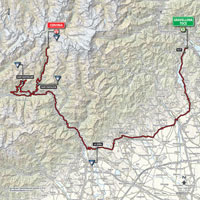
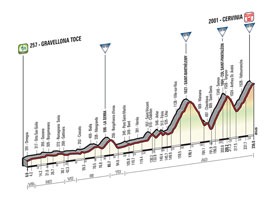
20/ Saturday 30 May 2015 - Saint-Vincent > Sestriere - 196 km
We'll go on with the forelast stage which will again be a mountain stage, starting in Saint-Vincent. The first 148 kilometers of the stage are relatively flat, via Turin, before they attack the climb of the Colle delle Finestre (18.45 km at 9.2% with a maximum of 14%), the rooftop of the Giro d'Italia 2015 - the Cima Coppi - with its 2178 meters. Its descent will rapidly be followed by the final climb towards the mountain top finish in Sestriere (9.2 km at 5.4% with a maximum of 9%).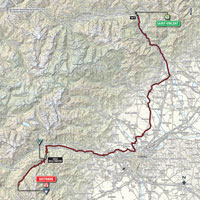
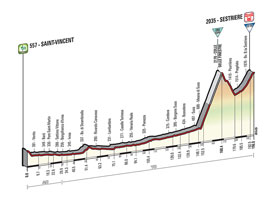
21/ Sunday 31 May 2015 - Torino > Milano - 185 km
The last stage will take place between Turin, European capital of sports in 2015, and Milan, the host city of the Expo 2015, over an entirely flat race route of 185 kilometers of which the final part is made up of 7 laps on a circuit of 6.4 kilometers.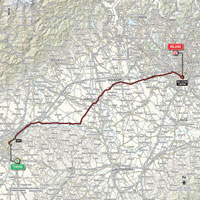
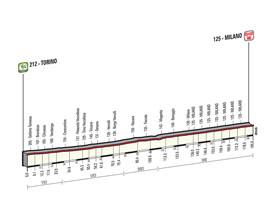
The "Etape du Tour", Giro edition: the Gran Fondo
The Giro d'Italia again organises an amateur stage in 2015 on the race route of the Giro d'Italia 2015, the Gran Fondo of the Giro. This will take place on Sunday 24 May 2015, with start and finish in Aprica and including the very difficult climb of the Passo del Mortirolo (12.8 km at 10.1% with a maximum of no less than 18%)The map with the race route of the Giro d'Italia 2015
Hereunder you'll find the official map with the Giro d'Italia 2015 race route: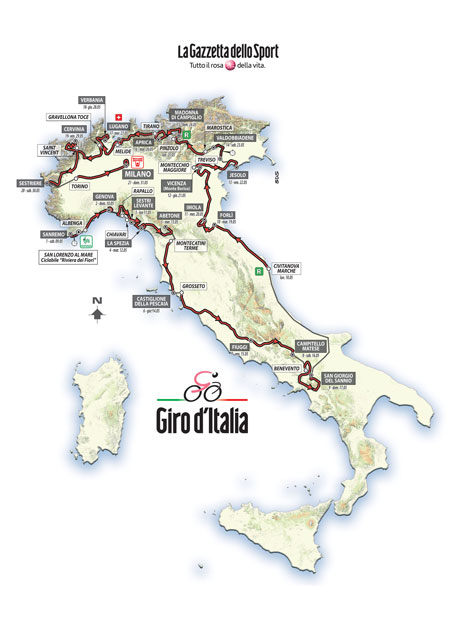
The Giro d'Italia 2015 race route in video
Hereunder you'll find the official presentation video of the Giro d'Italia 2015 race route:* Alfredo Martini is a former Italian rider, who participated 9 times to the Giro d'Italia (finishing 5 times in the top 10), former responsible for the selection of the Italian cycling team and honorary president of the Italian Cycling Federation, who died on 25 August of this year at 93 years
** the finish of the initial team time trial is in Sanremo
source photo article illustration: © Lapresse door Thomas Vergouwen
Vond u dit artikel interessant? Laat het uw vrienden op Facebook weten door op de buttons hieronder te klikken!
11 comments | 104570 views
this publication is published in: Giro d Italia | Giro d'Italia 2015





 by marco1988 over
by marco1988 over
Je reprends le commentaire que j'ai posté dans la section "à votre tour" d'André :
En ce qui me concerne, j'aime beaucoup ce tracé, je trouve qu'il présente l'avantage d'obliger celui qui voudra marquer ce Giro de son empreinte à prendre des risques, à oser sortir de sa tanière de façon surprenante plutôt que d'attendre les 3 derniers km de la dernière montée, puisque clairement, ce n'est pas dans la seule montée de Cervinia, Sestriere ou d'Aprica que les écarts se feront. A ce petit jeu, on sent clairement que RCS se libère de l'ombre de Zomegnan et de ses Giro inhumains. Je dis tant mieux.
Pour Verbania, la dernière montée est vraiment très difficile, 10km à 9% de moyenne, c'est largement du HC en France et même s'il n'y a pas d'enchainement avant pour fatiguer, ne perdons pas de vue qu'on est en troisième semaine et que l'étape d'Aprica était seulement 48h avant. Même si les athlètes de haut niveau récupèrent, une étape pareille a, à mes yeux, largement sa place en troisième semaine. Peut être aurait-il été un peu plus judicieux de ne pas la faire précéder directement une grosse étape comme celle de Cervinia.
Pour ce qui est des pourcentages, je trouve ça plus intéressant de faire intervenir des pourcentages moins acérés ou alors pas en montée finale, sinon il est certain que toutes les autres montées seront escamotées par peur de la dernière (c'est pourquoi je ne suis pas fan du Zoncolan).
Sinon, RCS flirte avec les limites, chrono d'à peine moins de 60km et une étape de plus de 260km, pas mal. Je ne suis pas du genre à descendre Prudhommes et ASO gratuitement, mais j'aimerais bien voir ce genre d'étapes flirtant avec l'acceptable sur le TDF. A condition bien sûr de ne pas en abuser (pas deux chronos de 50km+, pas trop d'étapes de 250km+).
Bonjour.
Dans mes 40 "cahiers du Giro', j'ai épousé le schéma 2015 : une première quinzaine axée sur la course de mouvements (étapes accidentées, de moyenne montagne et de plaine), et une dernière partie marquée d'étapes décisives avec un seul grand clm. individuel en pivot.
Mais, si je souscris pleinement à un final offrant des opportunités d'attaquer de loin, j'ai opté pour des arrivées au sommet aux pentes plus accentuées.
Par rapport aux dernières rumeurs (Rifugio Calvanico, Mortirolo-Trivigno vers Aprica, et un final inédit sur les hauteurs de Sauze d'Oulx pour la pénultième), ma première impression fut négative :
- arrivées au sommet trop roulantes
- un seul final en descente
- absence de "vertical"
- pas de grande étape de haute montagne (Aprica me fait penser à certaines étapes vers Morzine via Roselend-Saisies-Aravis-Colombière et le seul Joux-Plane, en substitut du Mortirolo, comme col vraiment dur et sélectif).
Dans la colonne "positif", je partage l'opinion de Freddy concernant la recherche d'enchainements choisis pour obliger les attaques de loin (Aprica, Cervinia et Sestrières) en dernière semaine.
Je ne qualifie pas les montées terminales dans le Valtellina ou le Val Chisone comme des "sommets". Ceux-ci se limitent donc à 4 (Toscane, Molise, Trentin, et Val d'Aoste). Plus "raisonnable".
Le choix d'un seul gros chrono (bien situé) est judicieux. Son impact sera supérieur à la Dordogne-Tour 2014, et plus favorable aux spécialistes.
Sur base d'info "Cicloweb", la deuxième partie du passo Serra se ferait "très petit braquet" avant un final "tortueux". J'inscris cette étape en positif au meme titre que La Spezia, également "cassante" dans les derniers kilomètres.
Enfin, quel "jouissance" de pouvoir "admirer" une carte de grand Tour "100% intra muros" avec peu de transferts.
Une étape en moins en Ligurie (4 c'est trop !) remplacée par la jonction Campanie-Adriatique et cela aurait encore eu plus de "gueule".
Au glogal, je revois un peu à la hausse mon impression première.
Mais, d'un point de vue "sportif", l'absence d'une grande étape de haute montagne avec arrivée en descente (deux ans de suite sans le "coeur" des Dolomites), et d'un vertical-final me donnent bien des regrets ...
Ciao.
Bonjour,
Merci Thomas pour cet article, plus facile de lecture que le site officiel !
Je relève trois points positifs :
- un long chrono vraiment plat (pas comme l'année cette année ou encore sur la Vuelta) : des écarts sont à prévoir et cela obligera forcément les moins bons rouleurs, qui préfèrent souvent ce genre de course au Tour de France, à prendre des risques.
- Je pensais à une montée est du Mortirolo, on a droit au côté ouest, qui offrira une belle sélection avec un parcours très usant auparavant.
- Breuil-Cervinia, montée à éviter, elle n'avait rien donné en 2012, sur le Tour du Val d'Aoste cette année avec St-Pantaleon avant non plus. Mais dans un contexte de 3e semaine où c'est l'avant-dernière possibilité pour tout tenter, et avec un St-Barthélémy irrégulier avant le tout, la course pourrait se décanter plus facilement.
Sinon, l'impression est vraiment négative :
. le Giro nous avais habitué à une belle étape vallonnée (déjà absente cette année), nous n'en avons pas : Fiuggi est ratée. Sur une étape longue et plus dure en 2011, une arrivée au sprint avait eu lieu, ce sera malheureusement pareil l'année prochaine ! Monte Serra, très dur, mais peut-il jouer un rôle si isolé ? Imola, alors que le départ était parfait, le circuit avec cette petite bosse rompt le rythme.
. Hormis les étapes d'Aprica, de Breuil et de Sestrieres, que des courses de côte sont à prévoir. Je retiens aussi 2011 où les favoris n'avaient pas bougé dans le Finestre vers Sestrieres, mais seulement dans les 5 derniers km, tout comme dans le Zoncolan cette année, pour tenter de tels coup, il faut encore avoir de la force la veille de l'arrivée.
. Et même dans les étapes difficiles, on ne retient aucun enchaînement de plusieurs cols.
Vers Verbania, pour répondre à Olivier qui s'interrogeait ailleurs, la rampe de Piancavallo, après le monte Ologne, est de 2.7 km à 8.8% environ, ce qui permet de rallonger considérablement la montée finale.
Je doute que cette montée seule soit suffisante, et c'est bien dommage, puisque c'est la seule arrivée en descente.
Le problème de ce parcours est le manque d'enchaînement et de possibilités pour attaquer de loin (Daone trop loin de l'arrivée à la Madonna di Campidoglio), et le relatif manque de pourcentage qui pourrait permettre aux grosses formations de contrôler la course pour leurs grimpeurs-rouleurs.
Bonne journée
@André #2 : Enfin, quel "jouissance" de pouvoir "admirer" une carte de grand Tour "100% intra muros" avec peu de transferts. => pour le Giro c'est en effet suffisamment remarquable pour être dit (et même écrit dans le titre de mon article :)) qu'il y a peu de transferts. Néanmoins, la petite excursion suisse ne vous a sans doute pas échappé ?!
@Aurélien M. : Merci Thomas pour cet article, plus facile de lecture que le site officiel ! => je me suis fait la même remarque en préparant l'article, probablement pour me rassurer sur le fait que le temps (important) passé dessus était bien utile ;-). Ton remerciement me reconfirme donc cette impression et ça fait toujours plaisir :).
Bonjour Thomas.
Lugano : je me demandais si quelqu'un ..."relèverait".
Fatale distraction ! Mea maxima culpa (je me confesserai !).
Je suis en désaccord (présentation officielle) sur la qualification de certaines étapes.
"Bombarder" Vicenza et meme La Spezia (étape très interessante) de moyenne montagne est excessif. Vallonnée-accidentée serait plus adapté.
Madonna di Campiglio haute montagne ? Excessif comparativement à Campitello Matese voire Verbania (le Segletta est plus difficile que le prometteur Daone ou la cote qui surplombe la station mondaine de la Brenta).
Haute montagne devrait etre réservé aux trips de haute altitude ou étapes avec minimum un col HC.
Autre chiffre qui me laisse perplexe : 43000m d'élévation.
Jadis des Giri/Tours de plus de 25000m étaient considérés comme (très) montagneux.
Tours 1990 et 1991 respectivement 17500 et 16500m de dénivellation.
Avec l'informatique qui intégre les 89m d'écarts entre le km 46 et le km 97 d'une étape de plaine on "frise" le ridicule.
Ciao.
@ André : Tour 1991, là vous prenez le pire du pire des années Leblanc!
Concernant ce Giro, on va dire que c'est Giro peu montagneux. Si cela avait été un Tour, on l'aurait qualifié de montagneux ou d'assez montagneux.
Beaucoup ont critiqué à de nombreuses reprises les parcours du Giro, on va voir ce que va donner cette édition 2015 un peu new-look. J'adore l'étape du Finestre personnellement.
Ce qui est vrai c'est que avant quand on calculait le denivele d'un Tour on prenait juste les montees des principaux cols, desormais la moindre variation d'une etape de plaine est integree et on se retrouve avec des etapes plates avec 2 bosses de 4eme categorie qui ont des deniveles de 500m ou plus.
Ce Giro a l'air bien different des precedents, deja car il manque un cronoscalata, ensuite parce qu'il reste quasiment en Italie, une rarete ces dernieres annees. Le chrono de 60km va faire beaucoup de degats chez les purs grimpeurs. Ca confirme que sauf orgie de chrono sur le Tour, un gars comme Rolland ne fera pas le Giro cette annee car il prendra quasiment 10 minutes sur ce chrono.
Bonjour,
André, je n'avais pas relevé votre phrase, mais il faut dire que Lugano/Melide est tellement proche de la frontière que 20 km de course en Suisse n'est même pas choquant !
Forcément, ça change radicalement du Tour avec ses 3 étapes (3.5 pour l'année prochaine) hors des frontières tout les deux ans (ou plus couramment si affinité).
Yoshi45, 10 minutes au chrono ? Peut-être pas non plus.
Pour juger de la participation, nous devrions attendre le 22 vu qu'aucune information ne ressort concernant le (ou les ?) chrono(s) et la montagne sur le Tour cette année.
Je ne dirais pas non plus qu'il s'agit d'un Giro peu montagneux, mais plutôt qu'il s'agit d'un Giro normalement montagneux, mais mal tracé !
Je pense que malheureusement RCS Sport a eu la mauvaise idée de partir du principe que seules les courses de côtes compte, alors autant ne jamais surcharger les étapes (même principe que pour la Vuelta ; après tout cette année, seul Rolland tentait de partir de loin constamment quand le tracé était favorable), tout en réfléchissant sur la possibilité des attaques lointaines (bosse dure - bosse finale facile) Pour offrir des renversements de situation. Je ne suis pas sûr que ce soit la solution quand on observe les équipes des grands favoris avec leurs équipiers qui seraient leaders dans certaines équipes du WT mais ils cherchent des solutions : c'est louable, et j'espère pour eux que ça marchera, sinon le meilleur favori dans le chrono serait en bonne voie pour remporter l'épreuve.
Ils ont aussi compris que la moyenne montagne devenait du coup un terrain moins maîtrisable. Mais là-dessus, le parcours est raté, sauf vers La Spezia ou la bosse finale pourrait être fatale à quelque-uns. Ils auraient dû offrir ce terrain après une première partie montagneuse pour éviter l'attentisme que nous aurons à coup sûr !
Bonne journée
Tout à fait d'accord à la reflexion avec Aurélien.
Le fait d'avoir repoussé toute la haute montage à la fin, ça va générer une course d'attente pendant 2 semaines vraisemblablement. A suivre...
@8, meme si ca n'est pas 10 minutes ca sera 7 ou 8 minimum. Rolland est un coureur que j'apprecie et qui est un tres bon grimpeur, mais qui aura toujours une tare immense en chrono. Les seules fois ou il arrive a limiter la casse c'est quand le chrono est vallone et pas trop long, comme sur le Giro 2014 ou Grenoble 2011. (sans parler de son superbe cronoscalata). Sur quasiment 60 bornes en grande partie plates il va se faire demonter non seulement par les specialistes mais pas les grimpeurs qui limitent bien mieux la casse en CLM.
Apres, dans tous les cas si il y a un CLM par equipe ca lui donne un handicap vu le niveau honteux d'Europcar dans cet exercice. Si Rolland va au Giro, ce sera, sauf fait de course, pour viser les victoires d'etape car il sera loin au general avant cette fameuse 3eme semaine.
Mais perso, je trouvele schema de ce Giro plus humain.
Et bien, moi, je le trouve très intéressant comme parcours, avec un certain nombre d'étapes accidentées, voir même de moyenne montagne... qui vont encourager les attaques. Étant donné que les favoris et leurs équipes ne peuvent pas cadenasser la course sur autant d'étapes, sur les deux premières semaines, ils seront bien obligés de répondre aux attaques des "seconds couteaux" et d’animer la course bien avant la dernière semaine de "haute montagne".
Quant au débat de savoir si les favoris vont attaquer avant la montée finale ou attendre les derniers kilomètres, cela dépend de tellement de paramètres et pas seulement du profil de l'étape, que cela rend le débat futile. Pour autant, avec le profil des différentes étapes, je serais vraiment étonné qu'il n'y ait aucun leader qui attaque avant la dernière ascension, surtout si des coureurs comme NIBALI ou CONTADOR sont au départ de ce GIRO 2015.
Vraiment, je suis impatient de voir ce Tour d'Italie 2015, qui pour moi est annonciateur de belles bagarres tout au long des trois semaines de courses.
Manu